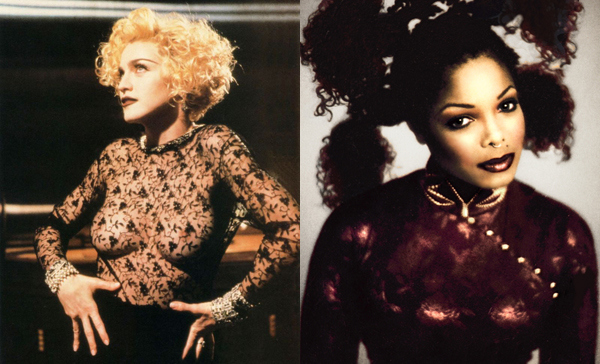A recent article put forth the notion that Janet Jackson is more important and influential as an artist than Madonna. Such an assertion is not only baiting, but overtly untrue. Not only did Madonna work far harder to secure her place in the music industry (whereas Janet already had that Jackson family name to bank on thanks to Michael and the Jackson 5), she has also been far more abundant and artistically provocative in her creative output.
Where it took Madonna all of one album to gain traction based on her original sound and street urchin-chic look, it took Janet all the way until her third album, Control, in 1986 to achieve even remotely the same level of renown. While some would like to chock this up to race and it being harder for a woman of color to get noticed back then, how does this explain the success of artists like Grace Jones, Sade, Jodie Watley and Tina Turner in the 1980s? To put it simply, Janet had to work toward becoming Janet, while Madonna always had the charisma and raw talent it took to get noticed.
As for the argument that Janet more heavily influenced the presence of modern black female artists like Beyonce and Rihanna, well, Madonna influenced these women just as much, if not more (Rihanna covered “Vogue” rather than a Janet song, after all, and Beyonce has appeared in a Madonna video, not a Janet one). Moreover, it becomes more racially limiting to say that “when progress is made on behalf of women that ends up only benefitting white women, it undermines the very ideas of equality that feminism strives to achieve.” Sorry to break it to y’all, but Madonna even helped Janet break into the mainstream thanks to her shattering of sexual barriers from the very first album, long before Janet started to stray away from her “Let’s Wait Awhile” message.
It is indeed safer to say that without Madonna, there would be no provocative female artist of any kind, whether your white Britney Spearses and Christina Aguileras or your black M.I.A.s and Ciaras. If Janet was all women had to look to, there would be far less emphasis on the importance of an all-encompassing package in order to be considered a multi-faceted artist.
Further, Madonna has always been far more engaging as a performer, her Rebel Heart Tour being the most current prime example of this. Where Janet relies on pure sexuality as art form, Madonna goes well beyond this motif by incorporating current issues and religious iconography within the narrative of her show.
With regard to the accusation that Madonna has continued to chase trends in her “old age” while Janet has strayed away from following what’s current, how does this explain her shift to a more pop influence on 2001’s All For You or the EDM flavor on her latest, Unbreakable? To use Madonna’s focus on image, as well as a love of younger men, against her is irrelevant to the subject of her music, which remains insightful and fresh thirty years on. Janet’s, eh, not so much. Maligning Madonna for keeping current rather than settling in to full-fledged remoteness merely shows the patriarchal desire for her to be put out to pasture because of her age.
Perhaps because Janet lacks the prolificness that Madonna has, she hasn’t been nearly as condemned for her every action, instead celebrated every time she comes back into the spotlight. In contrast, Madonna has too much to say to stay out of the public eye for very long. Even with regard to both of their film careers, Madonna bears the heavier brunt of criticism, with everyone seeming to conveniently forget how terrible The Nutty Professor II: The Klumps was.
The bottom line is, boiling the so-called competition between Madonna and Janet to race is, of course, going to force most people to side with Janet. Incidentally, Madonna always favored the incorporation of black music into her own, starting with her debut single, “Everybody,” which everyone assumed was the work of a black artist, and her work with legendary producers like Nile Rogers, Babyface, Dallas Austin, Pharrell and Timbaland. But most people would call that trend-chasing rather than progressiveness, wouldn’t they?



















